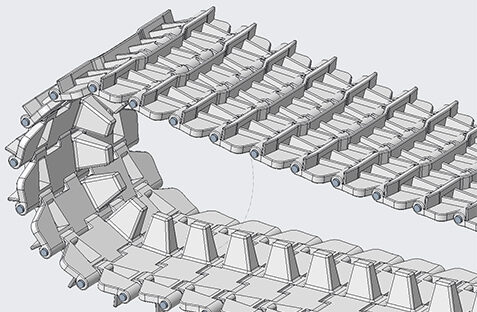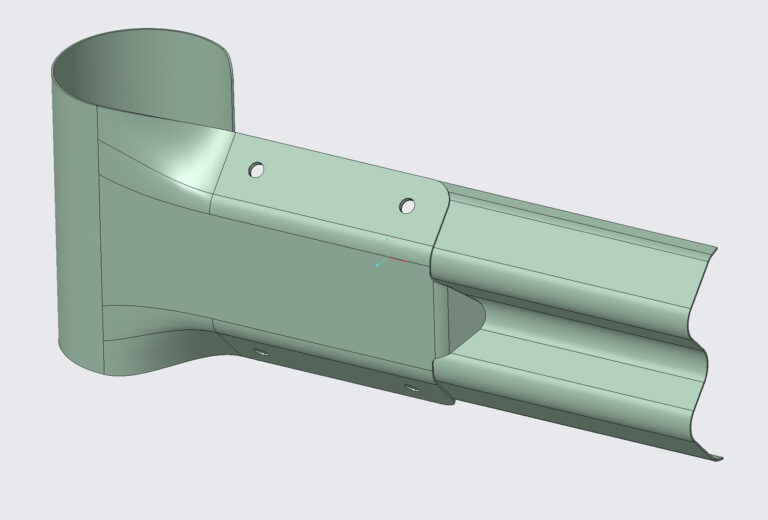Creo Update Training
Description - creo update training
Design Engine’s ‘Creo Update training’ offers more than just a basic refresher on using Creo. While it covers the latest functionalities in recent updates, this Creo training course if given proper time can also promote features introduced over the past 20 years that your team may not be fully utilizing. This course, in its various forms, is tailored for those who already consider themselves experts and are familiar with previous Creo releases. If you or your team aim to harness the full potential of this powerful toolset and strive to work smarter, not harder, fill out the form below and tell us about your team.
In this Creo training course Participants will learn new parametric modeling workflows and techniques, experimenting with multi-body parts and enhancements in Creo, such as Sketch Utilities, Surfacing, Assemblies, and Sheet Metal to name a few.
The difference between 2-day & 5-day course curricula simply is content. “Your more senior level engineers can benefit the most from the full week of Creo Update Training by adding as much as 30 percent efficiency” often explains our lead instructor. “Many simply use the software like it’s 1997 and there is so much more to this tool”, he goes on to add. Many efficiency changes have occurred over the past 10 or even 25 years. In reality, the 2-day plan is intensive and provides less time for participants to practice the examples during training. On the other hand, the 5-day structure offers a more comprehensive approach, covering tips, techniques, and new features from previous releases as far back as Wildfire 2.0 that your team is likely not utilizing for optimal success.
Our effort as a training organization is to help product designers & design engineers learn how to take strategic advantage of this amazing tool. Participants will learn to make changes quickly to become even more proficient and move faster through the interface. Consider the Design Engine Creo Update Training to help your team leverage this amazing toolset. Work smarter, not harder!


Version
Please let us know the version of Creo you are upgrading to and describe the types of products you develop in the “Register Now” tab above. Based on this information, we will create a customized training plan for your team, which can either be a 2-day or a 5-day program.
The 2-day plan is intensive and provides less time for participants to practice the examples during training. On the other hand, the 5-day plan offers a more comprehensive approach, covering tips, techniques, and new features from previous releases as far back as Wildfire 2.0 that your team may not yet be utilizing for optimal success.
Duration & Cost - Creo Update Training
16 hours = $1650, or 40 hours = $2850 per student
For corporate rates, please call (312)226-8339
Prerequisites
General knowledge of Creo or Creo Training: Learn to Design or a willingness to learn.
Video Training Delivery System
Ask your Design Engine account manager about our Training Delivery System(TDS), an easy-to-follow guide for designers and engineers who want a supplement to this course.
Related Courses
- Creo 7.0
- Creo 8.0
- CREO 9.0
- CREO 10.0
- CREO 11.0
Creo 7.0 UPDATE TOPICS
- General interface differences and enhancements
- Discover enhancements in new Search tools
- Skecher has new snapping and mirroring functionalities.
- Flexible Components
- Marker Menu exploration
- Learn to use rounds effectively i.e. Choroidal, G2, Conic, and Transitions
- Manage Warp functionality
- Simplified Reps in Part and Assembly modes
- Learn to exist within Failure Mode
- Maintain Draft in Complex Sweeps and Blends
- Curves: Projections vs. Wrap
- Techniques for selecting Components, Creating Direct Features, and Geometry
- Internally Grouping Datum Features
- Editing Surfaces: Copy, Move, Offset, Mirror, Merge, and Trim.
- Using Surfaces with respect to MutiBodies
- Rendering with Mental Ray
- Making and using textures
- Associate colors to features, surfaces and Multibodies
- Managing Parent/Child relationships more effectively
- View Manager: Simplified Reps, Style Reps, Explode States, and Saved Orientations
- Repeat Regions and BOMs
- Detailing and MBD have various updates to support latest industry standards.
- What’s new in Sheet Metal, Drawings, and MBD
GOALS
- Learn to manage Multibodies for a wide variety of uses including Top-down design
- Create complex relations with Parameters
- Learn to become comfortable using Reorder, Edit Definitions, Edit References
- Participants will receive a training material login and password for life
DISCUSSION
- Discuss how Creo tools and functions have matured over the years, and how they may evolve in the future
- Discuss how major manufacturers use top-down design with this latest release
- Multi-threading capabilities
- Compare and contrast User interface, workflow, and functions of Creo 7.0 to earlier versions
- Updating and customizing Creo 7.0 user interface.
- Discuss new ways to edit references
- Use 3D thickness-checking tools
- Enhanced draft analysis display
- Terms & Vocabulary changes
- New connection analysis tools
Creo 8.0 Update Training TOPICS
- Point out the general interface differences and enhancements
- Explore speed modeling enhancements
- Explore detachable multiple panels from the dashboard and display them at the same time. Also, learn to reset those panels if they are lost and or confusing.
- Flexible Components
- Marker Menu exploration
- Explore how to set transparency display for solid bodies, quilts, and tessellated geometry
- Modernized symbols, including a customizable symbol gallery, semantic definitions, and enhanced contextual commands and workflows for symbol editing and placement.
- The GD&T Advisor Plus extension now includes support for assemblies.
- Annotation mismatch manager for greater transparency and user control over GD&T Advisor updates
- Advanced surface collection methods for standalone annotations
- Improved sketching tools for drawing.
- Learn to use rounds effectively i.e. Choroidal, G2, G3 Continuity, Conic, and Transitions
- Explore model tree and how design intent is more clear for other persons working in your model tree
- Manage Warp functionality
- Explore enhanced tapped, tapered holes and medium-fit options for metric clearance.
- Simplified Reps in Part and Assembly modes
- Learn to exist within the Failure Mode
- Maintain Draft in Complex Sweeps and Blends
- Curves: Projections vs. Wrap
- Techniques for selecting Components, Creating Direct Features, and Geometry
- Explore new Lightweight representations for all hole types (helpful, for example, for speeding up models with many holes/hole patterns)
- Explore multi-hole features, with the new sketch-based placement option, including support for reference patterns based on the multi-hole feature. Compare with Solidworks if applicable.
- Internally Grouping Datum Features
- Editing Surfaces: Copy, Move, Offset, Mirror, Merge, and Trim.
- Explore Geodesic curves. For example, creating a curve between 2 points now has an extra option to ensure it represents the shortest distance over the surface between the 2 points. Helpful for cases when working with fabric in composite design or optimizing the layout and distribution of wiring and cabling.
- Using Surfaces with respect to MutiBodies
- Explore the newly enhanced GPU mode to improve rendering quality and performance
- Making and using textures
- Associate colors to features, surfaces and Multibodies
- Managing Parent/Child relationships more effectively
- View Manager: Simplified Reps, Style Reps, Explode States, and Saved Orientations
- Repeat Regions and BOMs
- Detailing enhancements with respect to the latest ASME standards
- What’s new in Sheet Metal Sheetmetal mode. For example learn to create multiple flat walls at the same time. This includes creating miters for 3-bend corner situations and corner reliefs for inner and outer corners automatically.
- Cabling or Harness design if applicable.
- Create a branch tape cosmetic feature in cabling
- Create stiff shrink cosmetic features in cabling
- Explore inseparable assembly components such as embed Copy & embed the component into its owner assembly as sub components
GOALS
- Learn to manage Multibodies for a wide variety of uses including Top-down design
- Create complex relations with Parameters
- Learn to become comfortable using Reorder, Edit Definitions, Edit References
- Participants will receive a training material login and password for life
DISCUSSION
- Discuss how Creo tools and functions have matured over the years, and how they may evolve in the future
- Discuss how major manufacturers use top-down design with this latest release
- Multi-threading capabilities
- Compare and contrast User interface, workflow, and functions of Creo 8.0 to earlier versions
- Updating and customizing Creo 8.0 user interface.
- Discuss new ways to edit references
- Use 3D thickness-checking tools
- Enhanced draft analysis display
- Terms & Vocabulary changes
- New connection analysis tools
Creo 9.0 Update Training TOPICS
- General interface differences and enhancements
- Explore speed modeling with Creo 9.0
- Discover enhancements in new Search
- Explore model tree enhancements, new toolbar in the tree provides faster access and clearer design intent
- Explore other model tree enhancements such as design tree has been enhanced for additional context and better visibility
- Flexible Components
- Marker Menu exploration
- Learn to use rounds effectively i.e. Choroidal, G2 & G3 continuity, Conic, and Transitions
- Quilt/body evolution tree helps others on your team understand the evolution of your geometry and facilitates handoff to other engineers
- Style tool enhancements
- Explore the new Divide and Unify surface capability and explore where used for MBD (think semantic annotation references). It’s also helpful for rendering aesthetics, simulation load regions, engraving, and generative design load and constraint surfaces
- Explore INSERT command that eases tree-centric design workflows and consumed multibody workflows
- Manage Warp functionality
- Simplified Reps in Part and Assembly modes
- Learn to exist within Failure Mode
- Maintain Draft in Complex Sweeps and Blends
- Curves: Projections vs. Wrap
- Techniques for selecting Components, Creating Direct Features, and Geometry
- Internally Grouping Datum Features
- Editing Surfaces: Copy, Move, Offset, Mirror, Merge, and Trim.
- Using Surfaces with respect to MutiBodies
- Rendering with Mental Ray
- Making and using textures
- Associate colors to features, surfaces and Multibodies
- Managing Parent/Child relationships more effectively
- View Manager: Simplified Reps, Style Reps, Explode States, and Saved Orientations
- Repeat Regions and BOMs
- Detailing enhancements with respect to the latest ASME standards
- What’s new in Sheet Metal, Drawings,
- MBD enhancements with modernization of Symbols
- Explore Sub’D enhancements such as simplified Freestyle brushes for an enhanced surfacing experience
GOALS
- Learn to manage Multibodies for a wide variety of uses including Top-down design
- Create complex relations with Parameters
- Learn to become comfortable using Reorder, Edit Definitions, Edit References
- Participants will receive a training material login and password for life
DISCUSSION
- Discuss how Creo tools and functions have matured over the years, and how they may evolve in the future
- Discuss how major manufacturers use top-down design with this latest release
- Multi-threading capabilities
- Compare and contrast User interface, workflow, and functions of Creo 9.0 to earlier versions
- Updating and customizing Creo 9.0 user interface.
- Utilize Split bodies and surfaces
- Discuss new ways to edit references
- Use 3D thickness-checking tools
- Enhanced draft analysis display
- Terms & Vocabulary changes
- New connection analysis tools
Creo 10.0 Update TOPICS
- General interface differences and efficiency enhancements
- explore speed modeling enhancements
- Leverage what’s new in Creo 10 Sketcher (chances are you are not leveraging what was newly added in recent years)
- Explore newly enhanced multibody modifications to help organize, reorder, and understand design intent more easily
- Discover enhancements in new Search
- Sketcher tools
- Flexible Components
- Marker Menu exploration
- Learn to use rounds effectively i.e. Choroidal, G2, Conic, and Transitions
- Manage Warp functionality
- Simplified Reps in Part and Assembly modes
- Learn to exist within Failure Mode
- Maintain Draft in Complex Sweeps and Blends
- Curves: Projections vs. Wrap
- Techniques for selecting Components, Creating Direct Features, and Geometry
- Internally Grouping Datum Features
- Editing Surfaces: Copy, Move, Offset, Mirror, Merge, and Trim.
- Using Surfaces with respect to MutiBodies
- Rendering with Mental Ray
- Making and using textures
- Associate colors to features, surfaces and Multibodies
- Managing Parent/Child relationships more effectively
- View Manager: Simplified Reps, Style Reps, Explode States, and Saved Orientations
- Repeat Regions and BOMs
- Detailing enhancements with respect to the latest ASME standards
- What’s new in Sheet Metal, Drawings, and MBD
GOALS
- Learn to manage Multibodies for a wide variety of uses including Top-down design
- More confidence using Top-Down Design with Mulitbodies in Creo 10
- Create complex relations with Parameters
- Learn to become comfortable using Reorder, Edit Definitions, Edit References
- Participants will receive a training material login and password for life
DISCUSSION
- Discuss how Creo tools and functions have matured over the years, and how they may evolve in the future
- Discuss how major manufacturers use top-down design with this latest release
- Multi-threading capabilities
- Compare and contrast User interface, workflow, and functions of Creo 10.0 to earlier versions
- Updating and customizing Creo 10 user interface.
- Discuss new ways to edit references
- Use 3D thickness checking tools
- Enhanced draft analysis display
- Terms & Vocabulary changes
- New connection analysis tools
Creo 11.0 Update TOPICS
- General interface differences and enhancements
- Leverage what’s new in Creo 11 Sketcher (chances are you are not leveraging what was newly added in recent years)
- Discover enhancements in new Search and Sketcher tools
- Improvements to multibody design workflow including support for the multibody design of sheet metal parts
- Explore Flexible Components
- Marker Menu exploration
- Learn to use rounds effectively i.e. Choroidal, G2, Conic, and Transitions
- Manage Warp functionality
- Simplified Reps in Part and Assembly modes
- Faster and more flexible definition of multiple projected point references with improved Spot welding
- Learn to exist within Failure Mode
- Maintain Draft in Complex Sweeps and Blends
- Curves: Projections vs. Wrap
- Techniques for selecting Components, Creating Direct Features, and Geometry
- Faster, more comfortable selection of many surfaces with support for Box, Lasso, and Trace selection as well as selection priority for Quilts
- Internally Grouping Datum Features
- Packaging optimization with pick-up enclosure volume information
- Editing Surfaces: Copy, Move, Offset, Mirror, Merge, and Trim.
- Using Surfaces with respect to MutiBodies
- Rendering with Mental Ray
- Easier creation of simplified models with a Shrinkwrap option to collect bodies from a referenced assembly into a part
- Making and using textures
- Associate colors to features, surfaces and Multibodies
- Managing Parent/Child relationships more effectively
- View Manager: Simplified Reps, Style Reps, Explode States, and Saved Orientations
- Repeat Regions and BOMs
- Detailing enhancements with respect to the latest ASME standards
- What’s new in Sheet Metal & detailed drawings
- GD&T Advisor has been enhanced with support for ISO 22081 for indication of general tolerances and combined simplified hole callouts for ISO models
- Electrification if applicable Creo 11 has improved design tools for cables & harness design
- Imports – explore what’s new in IDD & Creo 11 now supports export of STEP AP242, edition 3. This ISO standard for data exchange enables seamless sharing of 3D models along with associated semantic product manufacturing information.
- Access the remove locations capability to get a dynamic preview in the graphics area, expanded filtering, and Undo/Redo options with cabling
- Change harness settings during routing, with the cabling tree updated for greater visibility of harness structure
GOALS
- Learn to manage Multibodies for a wide variety of uses including top-down design
- More confidence using Top-Down Design with Mulitbodies in Creo 11
- Create complex relations with Parameters
- Learn to become comfortable using Reorder, Edit Definitions, Edit References
- Participants will receive a training material login and password for life
- How to use the new 2 degree geometry added new in Style’s Creo 11.0 for agronomy.
DISCUSSION
- Discuss how Creo 11.0 tools and functions have matured over the years, and how they may evolve in the future
- Discuss how major manufacturers use top-down design with this latest release and explore multi body with respect to top-down design
- Multi-threading capabilities
- Compare and contrast User interface, workflow, and functions of Creo 11.0 to earlier versions
- Updating and customizing Creo 11.0 user interface.
- Discuss new ways to edit references
- Use 3D thickness checking tools
- Enhanced draft analysis display
- Terms & Vocabulary changes
- New connection analysis tools
